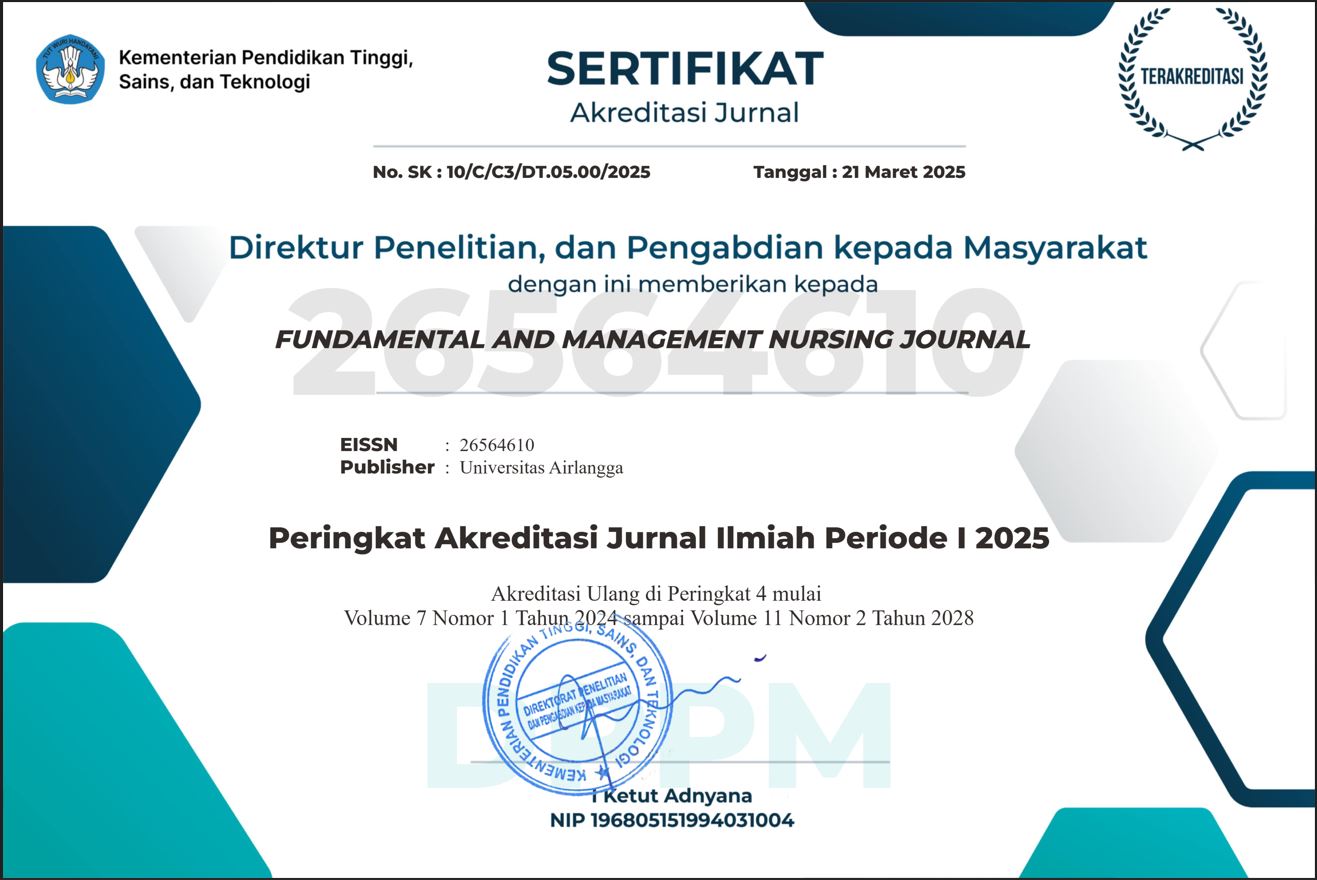The Relationship Between the Implementation of Islamic Values and Patient Loyalty in Inpatient Rooms
Introduction: Patient loyalty represents a critical challenge for hospitals and other healthcare organizations. A low level of patient loyalty may negatively affect an institution’s competitiveness and reflect poorly on the quality of healthcare services and workforce performance. In increasingly diverse healthcare settings, incorporating values that align with patients’ beliefs and expectations may play a role in fostering satisfaction and loyalty. This study aims to analyze the relationship between implementing Islamic values in inpatient care and patient loyalty.
Method: This study applied a correlational analytic design with a cross-sectional approach. Data were collected from a sample of 100 inpatients, selected through consecutive sampling over a two-week period. The study investigated the relationship between the implementation of Islamic values and patient loyalty. Two instruments were used to measure the study variables: the Islamic Service Questionnaire and the Patient Loyalty Questionnaire. Data were analyzed using the Spearman rank-order correlation test to determine the strength and direction of the association between the two variables.
Results: A total of 66% of patients perceived the implementation of Islamic values by nurses to fall within the moderate category. Similarly, 70% of patients demonstrated a moderate level of loyalty. Statistical analysis using the Spearman rank-order correlation test showed a significant relationship between the implementation of Islamic values and patient loyalty (p = 0.009; rₛ = 0.260), indicating a positive, albeit weak, correlation between the two variables.
Conclusion: This study demonstrates a significant positive relationship between the implementation of Islamic values in nursing care and patient loyalty in inpatient settings. By addressing spiritual needs, modifying the care environment to reflect Islamic principles, and providing adequate worship facilities, healthcare institutions may enhance the overall patient experience and increase retention. Future research is recommended to explore the long-term impact of faith-based care models on patient outcomes in broader and more diverse hospital settings.
1. INTRODUCTION
Patient loyalty presents a significant challenge for hospitals and other healthcare institutions. Low levels of loyalty can undermine organizational competitiveness and may be perceived as indicative of suboptimal service quality and staff performance. In today’s increasingly diverse healthcare environments, integrating values that align with patients’ cultural and religious beliefs has the potential to enhance satisfaction, trust, and long-term loyalty.
Recognizing and addressing these values is essential for fostering stronger patient-provider relationships and promoting sustainable engagement with healthcare services. The intense competition among hospitals encourages each facility to increase patient satisfaction and gain and maintain patient loyalty. Patient loyalty represents a customer's commitment to consistently purchase services. Loyalty formed from satisfaction with hospital services can encourage patients to return for treatment at the same facility because they feel comfortable, confident, and secure in receiving the best care according to their needs(Wahyu Wijayanti et al., 2015). Patient loyalty may decrease for treatment at hospitals if nurses exhibit poor behavior or lack professionalism(Anggraeni, 2020). Bhakti Wiyata Institute of Health Sciences Dental and Oral Hospital (RSGM IIK Bhakti Jaya Kediri) shows that patient loyalty is below 50%. Research conducted by Andi & Nurul (2021) at Bhayangkara Kendari Hospital found that patient loyalty was around 50%, while at the Lampung Regional Police Hospital, it was above 50%(Balqis et al, 2022). The results of the initial survey indicated 40% with high loyalty and 60% with moderate loyalty.
Factors that influence patient loyalty include direct evidence of the physical appearance and appearance of services that can be felt immediately, providing accurate and reliable services, being alert in providing services, guaranteeing quality and safety(Ermawaty et al., 2022). Patient loyalty factors are influenced by perceptions of service quality, customer satisfaction, customer trust, customer commitment (Lepojević & Đukić, 2018). The quality of service can be developed through modification of the service methods provided to patients, such as the implementation of Islamic values during patient care. Patient loyalty has a positive impact on hospitals. Patients who have a good impression or are satisfied with the service can spread positive news through word of mouth, so that patient loyalty can improve the image of health services(Fitri, 2016). Loyal patients will always be faithful in following the predetermined treatment plan or continuity of health care, so that the final result is that the patient gets maximum care for his recovery(Anggraeni, 2020).
The implementation of Islamic value in health services is designed to provide services for Muslim patients in accordance with Islamic principles(Ali, 2018). Patients who are muslims that the services provided by the hospital are in accordance with Islamic values, so that patients feel comfortable in receiving services(Hariyanto, 2015). The recitation of the basmalah before starting the action, polite and friendly health workers, the recitation of murottal in the patient room, and the hospital environment that provides an atmosphere of Islamic values(Rahma & Prayoga, 2022)cause patients to feel safe, comfortable, and valued as a muslim, so that the patient is satisfied. The integration of Islamic values can add positive value to the quality of services provided to patients. The positive impact that occurs is that patients and families will refer to the hospital to get health services(Hadytiaz et al., 2022). This study aims to analyze the implementation of islamic values and patient loyalty in the inpatient room.
2. METHODS
2.1 Design
The research design uses correlational analytics with a cross-sectional approach.
2.2 Population, Sample and Sampling
The study was conducted on 100 patients who were selected using consequential sampling for 2 weeks. Patients or families who are willing to become respondent and have visited the hospital more than 2 times be taken as research respondents. Patients or families who do not complete the questionnaire completely will be excluded from the study respondents.
2.3 Variable
The independent variable in this research was implementation of islamic values which was divided into categories that were high, moderate and low. The dependent variable was patient’s loyalty which were categorized into low, moderate, and high.
2.4 Instruments
The variable of the implementation of islamic values was measured using a questionnaire on the implementation of Islamic values consisting of 19 statement items covering 5 indicators. Indicators of Islamic health service 5 items, human resources involved in Islamic health services 5 items, characteristics that must be possessed by Muslim doctors and nurses 2 items, Islamic hospital management organization 1 items, and Islamic environment in Islamic hospitals 6 items. The questionnaire was filled out using a Likert scale with a score of 1 for rarely, a score of 2 for sometimes, a score of 3 for often and a score of 4 for always. The total score of the questionnaire on the implementation of Islamic values was divided into 3 categories, include high, moderate, low. The implementation of Islamic values is categorized as high if the total score is more than 75%, the category is medium if the total score is 60-75%, and the category is low if the total score is less than 60%. The instrument for the implementation of Islamic values has been tested for validity and declared valid, the reliability of the instrument shows a value of Cronbach's alpha 0.928 (reliable).
The patient loyalty variable was measured using a modification of the patient loyalty questionnaire(Hadytiaz et al., 2022)which was derived from 8 items. The
Copyright (c) 2025 Arrum Arrifani Alkhaidar, Nurul Hikmatul Qowi, Masunatul Ubudiyah

This work is licensed under a Creative Commons Attribution 4.0 International License.
1. The journal allows the author to hold the copyright of the article without restrictions.
2. The journal allows the author(s) to retain publishing rights without restrictions.
3. The legal formal aspect of journal publication accessibility refers to Creative Commons Attribution (CC BY).
















